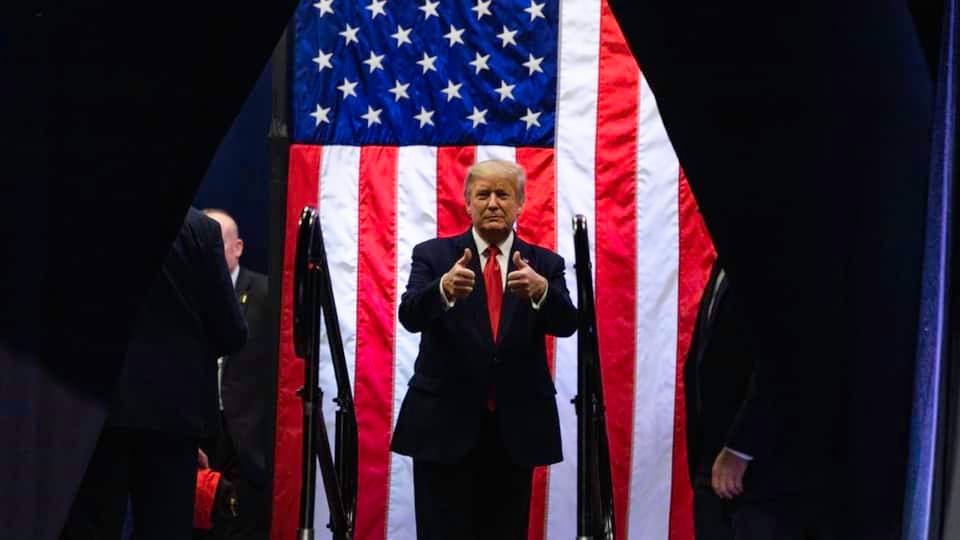
Whatever one thinks of him, Trump’s performance instincts are sharp. (File Photo: Donald J. Trump/Facebook)
By James K. Rowe, University of Victoria, The Conversation
A headline from the Canadian satirical publication The Beaverton captured the political mood among Democrats after the assassination attempt on Donald Trump: “Whatever you need to do to mentally prepare yourself for a second Trump presidency, go ahead and get started.”
Historical precedent supports this fatalism. Brazilian far-right leader Jair Bolsonaro was stabbed at an event in 2018, which intensified his public support. He won the presidency a month later.
Likewise, President Ronald Reagan saw a jump in his approval numbers after being shot in 1981. He mobilized that support to pass massive tax cuts months later.
So why does surviving political violence often bolster popular support? The most obvious reason is that surviving a horrific ordeal is humanizing and can generate public sympathy even among opponents.
The less obvious reason is that evading death can make politicians appear super-human, even god-like.
Performance instincts
Not only did Trump survive an attempted murder, but he had the presence of mind to stop and raise his fist to supporters before being rushed to safety by Secret Service agents. Whatever one thinks of him, Trump’s performance instincts are sharp.
His face bloodied, his posture defiant, the moment was captured in a now iconic photograph that is already emblazoned on T-shirts for sale.
The fact that Trump came within millimetres of his death and walked away makes him look like he’s channelling the powers of life and death.
If you look at images depicting the resurrection of Jesus Christ — especially the famous work by Italian Renaissance painter Piero della Francesca — there are clear resonances with the images of Trump: bloodied but “miraculously risen.”
For his supporters, Trump is a persecuted figure, a victim of “lawfare” waged by his political opponents. While in office, he was twice impeached, and since losing the presidency he has been the subject of multiple criminal investigations, most recently resulting in convictions on 34 felony counts.
And yet the most recent polls have shown him with a lead over President Joe Biden. Trump has already been likened to the original “Teflon Don,” John Gotti, a mobster able to evade multiple prosecutions.
Striking biblical tones
Trump’s various scandals would have sunk other politicians. And yet he continues to rise, both in the polls and now from the edge of death.
Aware that his multiple resurrections give him a god-like glow, Trump has declared that divine intervention assured his survival. Striking more apocalyptic notes, he rallied his supporters after the attack to remain “defiant in the face of wickedness” and not allow “evil to win.”
While Trump’s brush with mortality may humanize him for some opponents, it is the appearance of super-humanity that is most likely to drive up his poll numbers.
In his book Escape from Evil, Pulitzer Prize-winning anthropologist Ernest Becker argued:
“All power is in essence the power to deny mortality. Either that or it is not real power at all, not ultimate power, not the power that humankind is really obsessed with. Power means power to increase oneself, to change one’s natural situation from one of smallness, helplessness, finitude, to one of bigness, control, durability, importance.”
There are few better descriptions of Trump’s carefully sculpted image as a larger-than-life figure.
According to Becker, we cope with our fear of death by seeking “earthly heroism” in the eyes of our fellow humans. We seek social recognition that offers hits of power and control that compensate for our feelings of smallness and helplessness in the face of finitude.
With his gaudy displays of wealth and power, Trump has sought to communicate immensity, control, durability and importance. Even before he ran for president, you could buy an action figure in his likeness. Trump has successfully magnetized supporters who want to align themselves with his triumphs: His fame and fortune, his besting of political rivals and now his victory over death itself.
Forces of mortality
We can’t all be larger-than-life heroes, but we can experience vicarious heroism by aligning ourselves with our preferred champions. This behaviour gets replicated in professional sports, religion, entertainment — and also in politics.
Trump’s bloodied but defiant resurrection after the attempt on his life only further solidifies his preferred image as a superhero.
When you compare that narrative and affective punch to a candidate like Biden, who is very much encumbered by the forces of mortality, it makes sense that the political opponents of Trump have a sinking feeling that the tide has now turned irreversibly against them.
How can a faltering old man beat someone who appears god-touched? This is the massive narrative challenge facing the Democrats.
In my view, the best way out is to flip the script by having Biden drop out of the race. He can paint himself as a different kind of hero, one willing to sacrifice his ego and ambition for the good of the country.
The ensuing competition for his replacement will animate the Democrats and present them as the party of renewal — maybe not miraculous rebirth, but still a renaissance that could energize voters unhappy with both candidates. Views of Trump will come back down to Earth during the heat of the campaign when voters will be reminded that despite victory over death, he remains human — all too human.![]()
James K. Rowe, Associate Professor of Political Ecology, University of Victoria
This article is republished from The Conversation under a Creative Commons license. Read the original article.



























